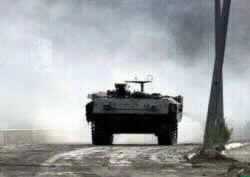Israeli troops shot and killed a mentally disabled Palestinian on Monday and arrested an alleged activist accused of killing a 10-month-old Israeli girl last year in the West Bank city of Hebron. A Palestinian Cabinet minister, meanwhile, joined a growing chorus of Palestinian leaders questioning the use of violence in the 26-month-old uprising against Israel.
Planning Minister Nabil Shaath said attacks on all Israeli civilians must stop, including those on Jewish settlers in the West Bank and Gaza Strip. "Stopping targeting Israeli civilians is a step that needs to be implemented," Shaath said.
The Palestinian Authority has condemned attacks on civilians in Israel, but has said settlers and occupation soldiers remain legitimate targets.
In Monday's violence, Israeli occupation troops shot and killed a 28-year-old mentally disabled Palestinian, Basel al-Koa, at an occupation army checkpoint near the West Bank town of Tulkarem. The occupation army said its soldiers opened fire when the man refused an order to halt and started running.
Near the city of Nablus, a 25-year-old woman was shot dead by occupation troops and her husband and her mother were wounded as they drove along a dark road in defiance of a dusk-to-dawn military curfew, Palestinian security sources said.
Prime Minister Ariel Sharon's office, meanwhile, said the Shin Bet security service has arrested a Palestinian accused of killing 10-month-old Shalhevet Pass at a Jewish enclave in Hebron in March 2001. The suspect was a leading member of Yasser Arafat's Fatah movement in the city.
Jewish settler leaders called for the death penalty for the alleged activist.
While Israel has in the past sentenced convicted Palestinian activists to death, the death sentence has been carried out only once - in the case of Nazi leader Adolf Eichmann, snatched by Israeli agents from his hide-out in Argentina in 1960 and brought to Jerusalem to stand trial.
Israel's Supreme Court on Monday temporarily put on hold government plans to tear down 15 Palestinian homes in Hebron to make way for a wider road connecting a Jewish settlement to shrines in the city center. The government ordered the demolitions after a Palestinian ambush in Hebron that killed 12 Israelis. The court will hear an appeal against the orders by human rights organizations on Dec. 18.
Palestinian witnesses and security sources in the Gaza Strip's Rafah refugee camp said an Israeli occupation army bulldozer backed by armored vehicles demolished a house near the Israeli-Egyptian border.
Also Monday, Palestinians warned of a "dangerous escalation" of tensions if Israel stops Arafat from celebrating Christmas in Bethlehem for a second straight year.
The warnings came after an adviser to Sharon, Raanan Gissin, said Arafat should not try to attend Christmas Mass in Jesus' traditional birthplace. Gissin stopped short of saying Israel would bar him from the city.
Arafat, a Muslim, began attending Midnight Mass in Bethlehem, site of Jesus' birth, in 1995, after the city was turned over to Palestinian control.
Last year, Sharon's security Cabinet banned him from going to Bethlehem from his office in Ramallah. The security Cabinet has not made a decision yet this year.
However, Gissin told AP that Arafat "should stay in his place ... because he has caused much tragedy to the Christian population, and he didn't do anything to advance the cause of peace."
Asked if Israel would stop Arafat from attending, Gissin said, "I didn't say we would stop him. I just said that he should stay in his place."
Palestinian Cabinet minister Saeb Erekat said Arafat had an obligation to be with his people on Christmas.
"I think this will be a very dangerous escalation not only on the security level but also as far as the political situation is concerned," Erekat said.
PHOTO CAPTION
An Israeli tank uses camouflage smokes during a patrol in the West Bank city of Jenin, December 9, 2002. REUTERS/Ammar Awad
- Dec 09 9:42 AM ET
- Author:
& News Agencies - Section:
WORLD HEADLINES


 Home
Home Discover Islam
Discover Islam Quran Recitations
Quran Recitations Lectures
Lectures
 Fatwa
Fatwa Articles
Articles Fiqh
Fiqh E-Books
E-Books Boys & Girls
Boys & Girls  Women
Women










